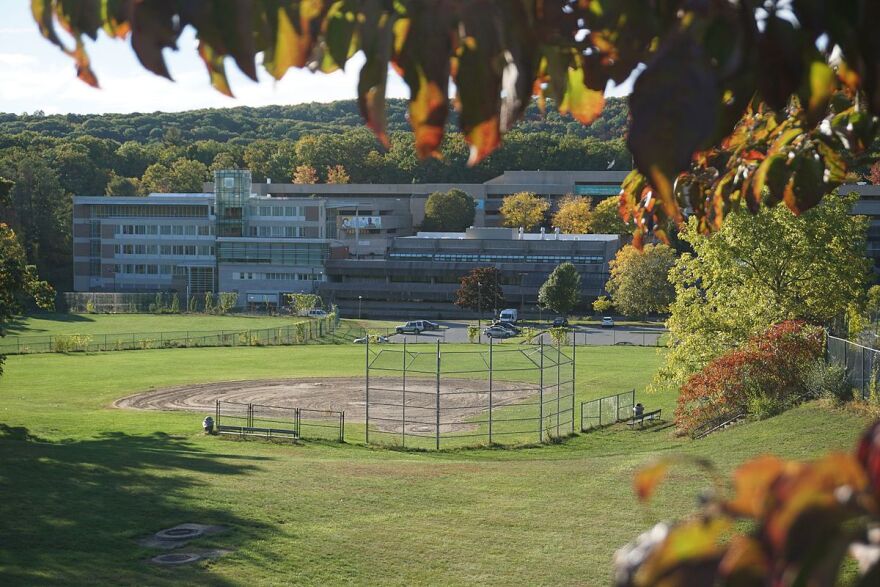Fighting back tears, incoming MassBay Community College interior design student Danita Mends recounted on campus Thursday how she had to drop out of college and enter the workforce in the early 2000s due to financial setbacks.
In the workplace, Mends found she was "hitting ceilings" and "being overlooked constantly" for opportunities. Mends made the decision to return to school, but she ran into more financial obstacles as she became pregnant and had a son.
The latest disruption to her higher education journey is coming to a close due to the launch of a state-funded free community college program, called MassReconnect.
"I got called and was told that I was eligible for this program, which is going to be life-changing for me," said Mends, who attended Needham Public Schools, at a press conference in Wellesley. "It's been a long road and to have this financial burden lifted is amazing. And I'm excited for the opportunities that are going to open up and the things that are going to change my family."
The fiscal 2024 state budget that Gov. Maura Healey signed into law earlier this month allocates $20 million to MassReconnect for students ages 25 and older who have not yet earned a college degree. Students must still apply for federal financial aid, and money from MassReconnect is meant to cover last-dollar costs, including for remaining tuition expenses, fees, books and supplies.
"MassReconnect is now one of the most comprehensive and accessible free community college programs in the entire country," Healey said at the press conference. "It means the world to us to be able to be part of this, and I believe (it) will have a transformative impact for thousands of students, their families around the state, for our workforce and economy."
Healey's office estimates 6,500 to 8,000 students will take advantage of MassReconnect in its first year, though that figure could climb to 10,000 by fiscal 2025 as community colleges work to raise awareness of the program.
Still, that's likely only a fraction of the population eligible for the program. Roughly 720,000 Massachusetts students have taken some college classes but don't yet have a degree and are no longer enrolled, according to 2021 data from the National Student Clearinghouse.
The Healey administration estimated in March that there are more than 1.8 million Bay Staters, including many who are people of color, ages 25 and older who have a high school diploma or equivalency who could benefit from MassReconnect.
Healey pitched MassReconnect in her budget proposal, which was then advanced by the House and Senate in their budget deliberations. All 15 community colleges will also receive $100,000 to help implement the program, Healey's office said.
There's also $12 million in the budget for officials to map out a strategy for launching a universal free community college system in 2024, plus $18 million for a free community college program for nursing students of any age.
Secretary of Education Patrick Tutwiler said adult community college students are persistent and driven. But their higher education pursuits can be derailed by factors outside their control -- such as a new family member to care for or unexpected medical bills -- or by the struggle to balance higher education with work and family, Tutwiler said.
"I've heard firsthand, unfortunately, just how many of our students in the commonwealth for whom these challenges are the case," Tutwiler said. "Today, things change. With MassReconnect, we're able to eliminate the biggest barrier to higher education: the cost of attendance."
Senate President Karen Spilka described herself as the "product of public higher education" as she joined Healey administration officials and lawmakers to celebrate the program's launch.
Days after graduating from high school, Spilka learned that her family could no longer afford sending her to a private university in New York, where she'd been planning to attend. Spilka turned back to the public universities that she'd declined and found one school willing to "open their doors" and give her a spot.
"I still get the goosebumps because being a typical 18-year-old, when I heard that from my father, I have to say, my response was, 'OK, I'm not going to college then...'" the Ashland Democrat said. "Community college is the gateway for so many of our students and our kids who never thought they would be able to go to public higher ed or to higher ed."
Earlier this summer, as the budget remained lodged in private negotiations, community college leaders warned that an increasingly compressed timeline would mean less time to fully implement MassReconnect and recruit potential students for the upcoming year. Noe Ortega, commissioner of the Department of Higher Education, urged people Thursday to "spread the word" about MassReconnect with the fall semester fast approaching.
Ortega said the department is preparing to launch an "office of success," ensuring MassReconnect students "persist to completion" for their degrees.
"The promise of you getting in is not enough," Ortega said. "We have to make sure that you succeed."




